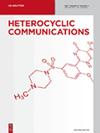Synthesis of rhodium catalysts with amino acid or triazine as a ligand, as well as its polymerization property of phenylacetylene
IF 1.5
3区 化学
Q3 CHEMISTRY, ORGANIC
引用次数: 0
Abstract
Abstract Three novel rhodium complexes, with l-tyrosine (l-Tyr), l-arginine (l-Arg), or 2,4-diamino-6-phenyl-1,3,5-triazine (Dpt) as a ligand, named as [Rh(cod)(l-Tyr)], [Rh(cod)(l-Arg)], and [Rh(cod)(Dpt)2], respectively, had been synthesized for catalyzing the polymerization of phenylacetylene. Their yields were 62.34, 54.87, and 58.21%, respectively, by the most suitable synthesis conditions at 25°C for 4 h. The structures and purity of these complexes were proved by 1H NMR, element analysis, and scanning electron microscope (SEM). It has been examined that phenylacetylene could be polymerized by the three complexes as catalysts with high degrees of polymerization (n = 368, 385, and 664, respectively) and yields (about 87.62, 88.39, and 59.67%, respectively). In conclusion, compared with traditional [Rh–N] type catalysts, the novel [N–Rh–N] type catalyst ([Rh(cod)(Dpt)2]) gained better catalytic performance. By comparing the yield, Mw, and degree of their polymerization, the polymerization mechanism was found under the [N–Rh–N] type rhodium catalyst system.以氨基酸或三嗪为配体的铑催化剂的合成,以及其对苯乙炔的聚合性能
摘要以l-酪氨酸(l-Tyr)、l-精氨酸(l-Arg)或2,4-二氨基-6-苯基-1,3,5-三嗪(Dpt)为配体,合成了三种新的铑配合物,分别命名为[Rh(cod)(l-Tyr)]、[Rh(鳕鱼)(l-Arg)]和[Rh(cod)(Dpt)2],用于催化苯乙炔的聚合。在25°C、4 h.通过1H NMR、元素分析和扫描电子显微镜(SEM)证实了这些配合物的结构和纯度。研究表明,三种配合物作为催化剂可以使苯乙炔聚合,聚合度高(分别为368、385和664),产率高(分别约为87.62、88.39和59.67%)。总之,与传统的[Rh–N]型催化剂相比,新型[N–Rh–N]催化剂([Rh(cod)(Dpt)2])获得了更好的催化性能。通过比较它们的产率、Mw和聚合度,发现了[N–Rh–N]型铑催化剂体系下的聚合机理。
本文章由计算机程序翻译,如有差异,请以英文原文为准。
求助全文
约1分钟内获得全文
求助全文
来源期刊

Heterocyclic Communications
化学-有机化学
CiteScore
3.80
自引率
4.30%
发文量
13
审稿时长
1.4 months
期刊介绍:
Heterocyclic Communications (HC) is a bimonthly, peer-reviewed journal publishing preliminary communications, research articles, and reviews on significant developments in all phases of heterocyclic chemistry, including general synthesis, natural products, computational analysis, considerable biological activity and inorganic ring systems. Clear presentation of experimental and computational data is strongly emphasized. Heterocyclic chemistry is a rapidly growing field. By some estimates original research papers in heterocyclic chemistry have increased to more than 60% of the current organic chemistry literature published. This explosive growth is even greater when considering heterocyclic research published in materials science, physical, biophysical, analytical, bioorganic, pharmaceutical, medicinal and natural products journals. There is a need, therefore, for a journal dedicated explicitly to heterocyclic chemistry and the properties of heterocyclic compounds.
 求助内容:
求助内容: 应助结果提醒方式:
应助结果提醒方式:


